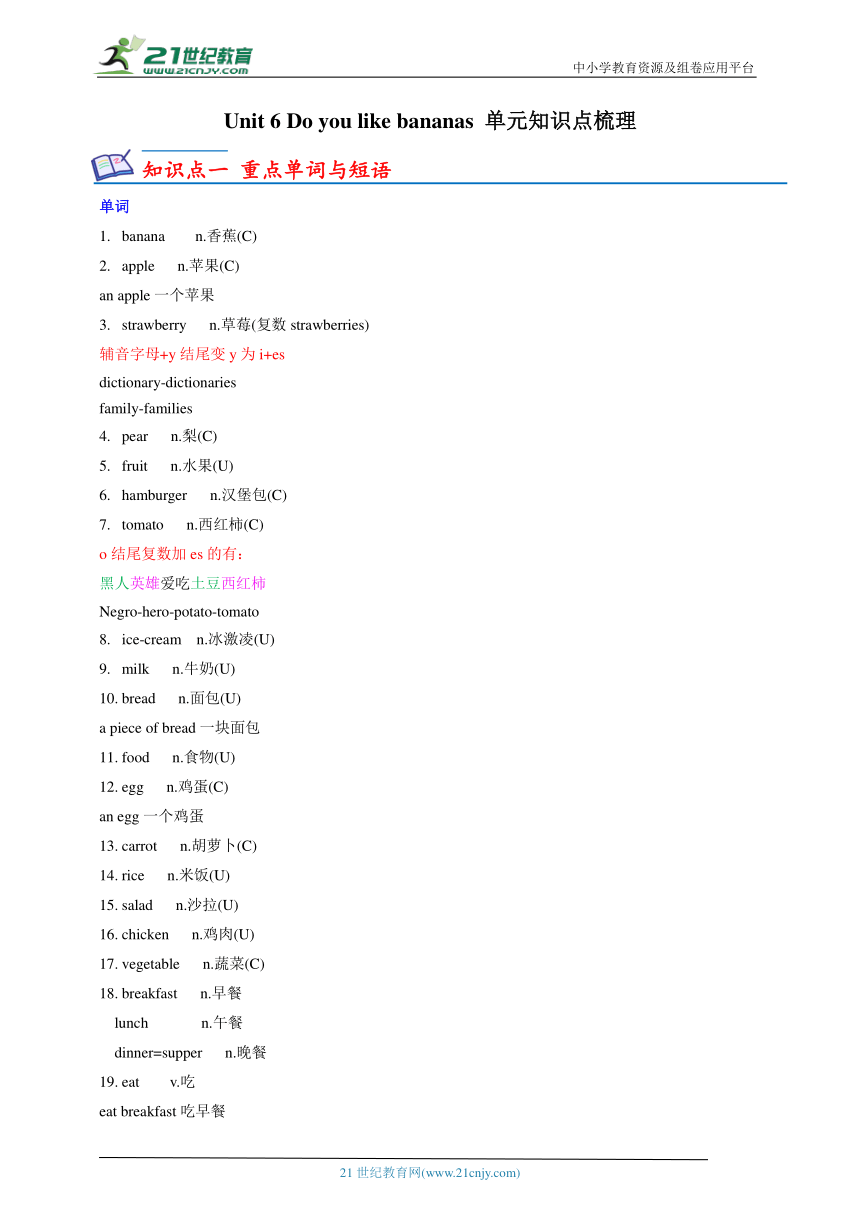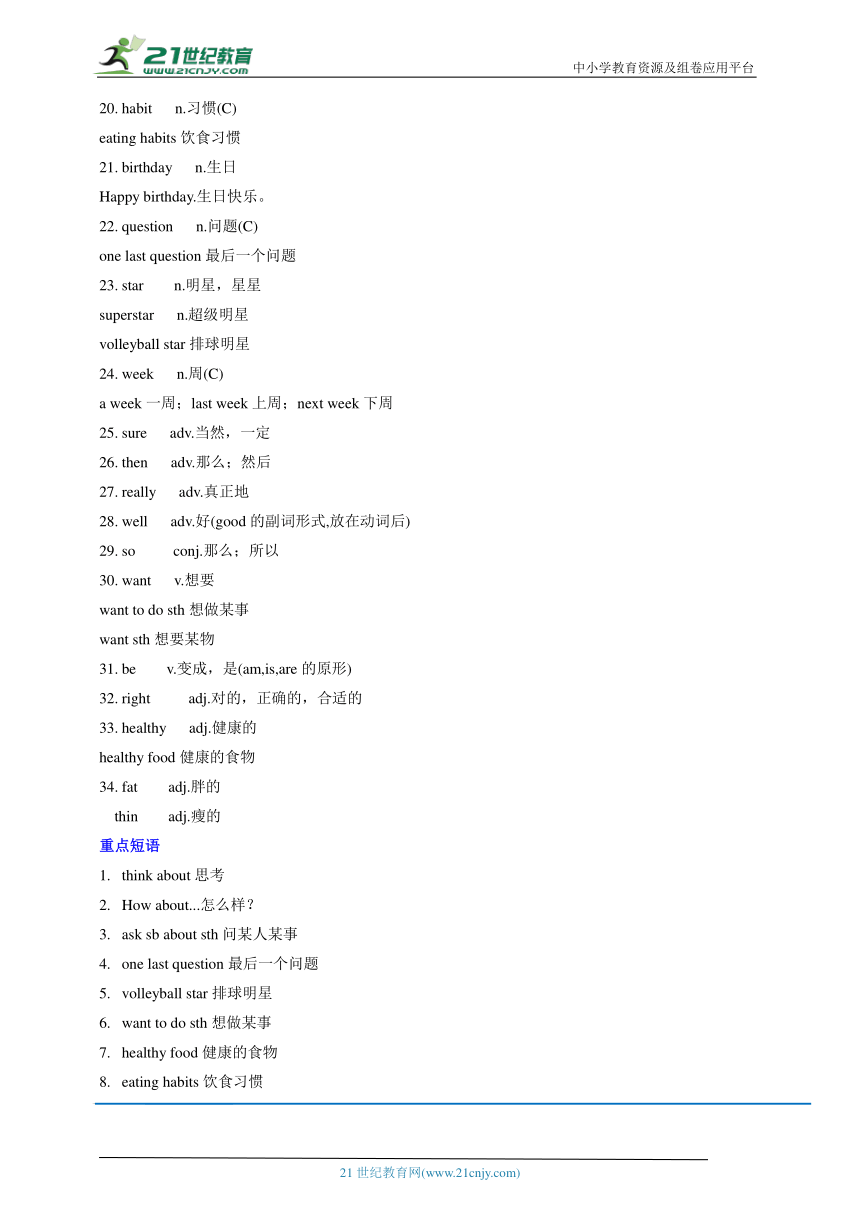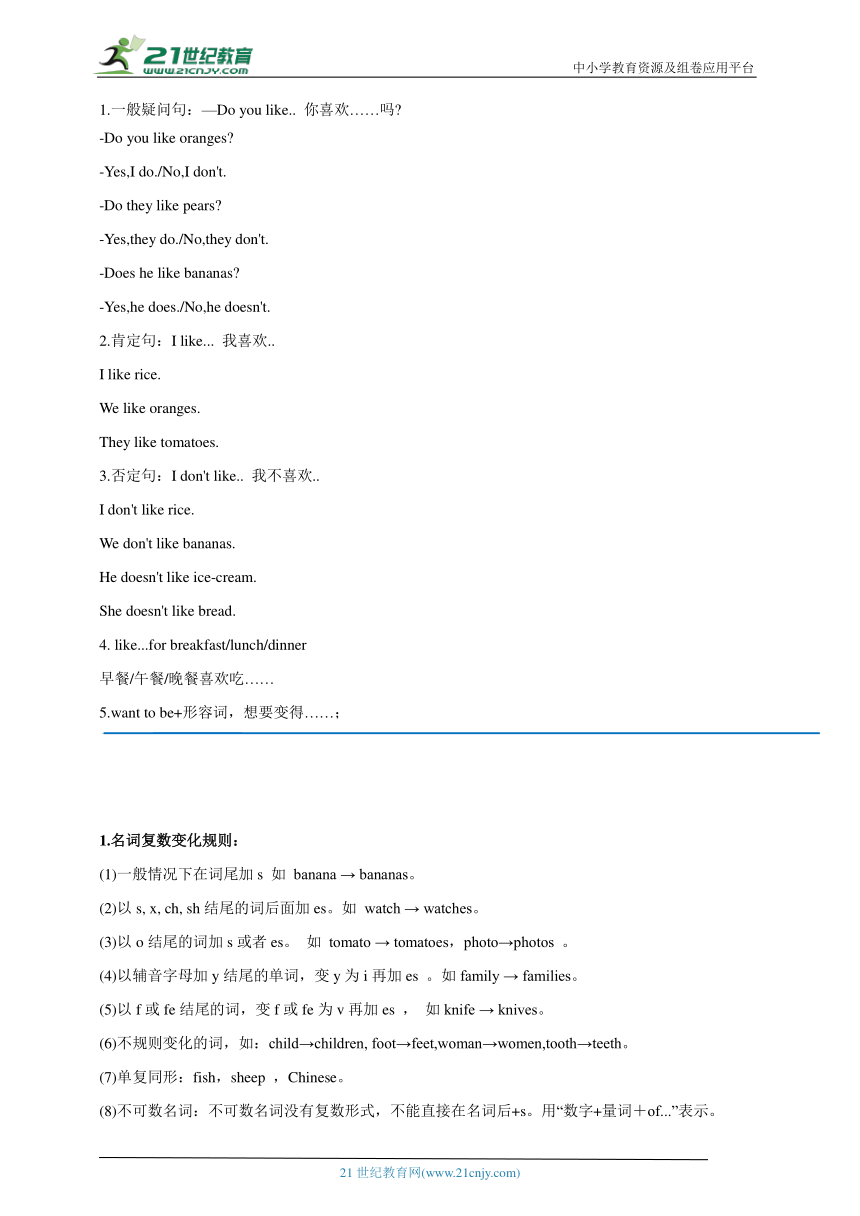Unit 6 Do you like bananas单元知识点梳理
文档属性
| 名称 | Unit 6 Do you like bananas单元知识点梳理 |  | |
| 格式 | docx | ||
| 文件大小 | 1.0MB | ||
| 资源类型 | 试卷 | ||
| 版本资源 | 人教新目标(Go for it)版 | ||
| 科目 | 英语 | ||
| 更新时间 | 2023-11-22 22:11:18 | ||
图片预览



文档简介
中小学教育资源及组卷应用平台
Unit 6 Do you like bananas 单元知识点梳理
(
知识点一 重点单词与短语
)
单词
banana n.香蕉(C)
apple n.苹果(C)
an apple一个苹果
strawberry n.草莓(复数strawberries)
辅音字母+y结尾变y为i+es
dictionary-dictionaries
family-families
pear n.梨(C)
fruit n.水果(U)
hamburger n.汉堡包(C)
tomato n.西红柿(C)
o结尾复数加es的有:
黑人英雄爱吃土豆西红柿
Negro-hero-potato-tomato
ice-cream n.冰激凌(U)
milk n.牛奶(U)
bread n.面包(U)
a piece of bread一块面包
food n.食物(U)
egg n.鸡蛋(C)
an egg一个鸡蛋
carrot n.胡萝卜(C)
rice n.米饭(U)
salad n.沙拉(U)
chicken n.鸡肉(U)
vegetable n.蔬菜(C)
breakfast n.早餐
lunch n.午餐
dinner=supper n.晚餐
eat v.吃
eat breakfast吃早餐
habit n.习惯(C)
eating habits饮食习惯
birthday n.生日
Happy birthday.生日快乐。
question n.问题(C)
one last question最后一个问题
star n.明星,星星
superstar n.超级明星
volleyball star排球明星
week n.周(C)
a week一周;last week上周;next week下周
sure adv.当然,一定
then adv.那么;然后
really adv.真正地
well adv.好(good的副词形式,放在动词后)
so conj.那么;所以
want v.想要
want to do sth想做某事
want sth想要某物
be v.变成,是(am,is,are的原形)
right adj.对的,正确的,合适的
healthy adj.健康的
healthy food健康的食物
fat adj.胖的
thin adj.瘦的
重点短语
think about思考
How about...怎么样?
ask sb about sth问某人某事
one last question最后一个问题
volleyball star排球明星
want to do sth想做某事
healthy food健康的食物
eating habits饮食习惯
(
知识点二 重点句型
)
1.一般疑问句:—Do you like.. 你喜欢……吗
-Do you like oranges
-Yes,I do./No,I don't.
-Do they like pears
-Yes,they do./No,they don't.
-Does he like bananas
-Yes,he does./No,he doesn't.
2.肯定句:I like... 我喜欢..
I like rice.
We like oranges.
They like tomatoes.
3.否定句:I don't like.. 我不喜欢..
I don't like rice.
We don't like bananas.
He doesn't like ice-cream.
She doesn't like bread.
4. like...for breakfast/lunch/dinner
早餐/午餐/晚餐喜欢吃……
5.want to be+形容词,想要变得……;
(
知识点三 重点语法
)
1.名词复数变化规则:
(1)一般情况下在词尾加s 如 banana → bananas。
(2)以s, x, ch, sh结尾的词后面加es。如 watch → watches。
(3)以o结尾的词加s或者es。 如 tomato → tomatoes,photo→photos 。
(4)以辅音字母加y结尾的单词,变y为i再加es 。如family → families。
(5)以f或fe结尾的词,变f或fe为v再加es , 如knife → knives。
(6)不规则变化的词,如:child→children, foot→feet,woman→women,tooth→teeth。
(7)单复同形:fish,sheep ,Chinese。
(8)不可数名词:不可数名词没有复数形式,不能直接在名词后+s。用“数字+量词+of...”表示。
a glass of milk 一杯牛奶 two pieces of bread两片面包
2.第三人称单数
在一般现在时当中,当主语是单数及不可数名词时(排除I,you)都视为是第三人称单数,谓语动词要用三单形式即加s或es.
eg:He likes pears,but he doesn’t like strawberries.
My brother eats an egg for breakfast.
Sports star eats well.
3.动词+名词复数或不可数名词
eg:She likes tomatoes. We like rice. Do you like salad
4.for+三餐
eg:What do you like for dinner I like chicken for dinner.
(
知识点四 重点知识
)
1. 关于动词like—喜欢
(1).like sb. / sth. 喜欢某人/某物;例如:Most students like eggs for breakfast. 大多数学生喜欢鸡蛋作为早餐。又如:All of us like our English teacher’s class. 我们都喜欢英语老师的课。
(2). like to do sth. 喜欢/想要做某事(表一次性或特指的某一具体的动作);例如:He likes walking to school ,but today he likes to ride a bike. 他喜欢走路上学,但是今天他(喜欢)想要骑自行车。又如:今天很冷,我喜欢呆在家里。It is cold today , I like to stay at home.
(3). like doing sth 喜欢做某事(表习惯性的动作或爱好);例如:The girl likes drinking milk in the morning .女孩儿喜欢早上喝牛奶。又如:我喜欢每天打篮球。I like playing basketball every day.
2. Do you like bananas 你喜欢香蕉吗?可数名词可用复数表示一类人或事物。在叙述某人喜欢某种水果或者蔬菜的时候,一般用名词复数。
3.名词的分类
(1). 名词分为“专有名词”和“普通名词”两大类。专有名词是个别的人、事物、地点等专有的名称,如:Gina, China, The Great Wall。专有名词的第一个字母要大写。
(2).普通名词又可分为下面四类:
①个体名词:表示某类人或东西中的个体。如:pen, student, apple, desk。
②集体名词:表示若干个体组成的集合体。如:family, class ,school。
③物质名词:表示无法分为个体的物质。如:water, broccoli等。
④抽象名词:表示动作、状态、品质、情感等。如:work, happiness等。
个体名词和集体名词都是可数名词,物质名词和抽象名词都是不可数名词。
(3).有些名词既可作可数名词又可作不可数名词,但意义不同,要注意区分。
①glass—杯子(可数名词) glass—玻璃(不可数名词)
Orange—橘子(可数名词) Orange—橙汁(不可数名词)
②还有表示动物类的名词,表示动物时是可数名词,作为菜肴时是不可数名词。
Chicken—小鸡(可数名词) Chicken—鸡肉(不可数名词)
Fish—鱼(可数名词) Fish—鱼肉(不可数名词)
③salad, ice cream, food, fruit作总称讲是不可数名词,作种类讲是可数名词。
例如:She likes hamburgers, salad and apples. 又如:This is a salad of tomato.
4. good / well都可以表示“好”,一个是形容词,一个是副词。
(1). good adj. “好的”,常用来修饰名词,也可放在系动词后做表语。
He is a good student 他是一位好学生。 That sound good.(表语) 这主意听起来不错。
(2).well的用法集合
①adj. “好的”,“健康的”(指身体好)He doesn’t feel well. 他感觉不舒服。= He’s not feeling well.
②adv. “好”常用来修饰动词,放在动词之后。He learns English well. 他英语学得好。 又如:Sports star eats well. 运动明星吃得好
5. 许多
(1).lots of = a lot of 修饰可数或不可数名词。lots of / a lot of bananas 许多香蕉(此处的lots of和many用法差不多)
lots of / a lot of milk 许多牛奶 (此处的lots of和much表示数量的用法差不多)
Tom has lots of good eating habits. 汤姆有很多好的学习习惯。
(2).many修饰可数名词复数,表示“许多...”
many boys 许多男孩儿\ many apples许多苹果
(3).much修饰不可数名词
much water许多水 much broccoli许多花菜
6. think about 思考;考虑;例如:Let’s think about what to do next. 让我们思考一下接下来做什么。
7. sports star 体育明星
sport作修饰语时通常用复数形式。如:sports meeting 运动会;sports shoes 运动鞋
8. ask sb. about sth. 询问某人关于某事的情况
He asked me about the party. 他问我关于聚会的一些情况。
9. What do you like for breakfast 你早餐喜欢(吃)什么?
10. For breakfast, she likes eggs, bananas, and apples.= She likes eggs, bananas, and apples for breakfast. 她早餐喜欢吃鸡蛋,香蕉和苹果。
sb like...for + 某餐 = For + 某餐,sb. Like(s)...(某人某餐喜欢吃什么)
11. I don’t want to be fat. 我不想变胖。
want to be… “想要成为……;想要变得……”,动词be后接形容词或名词。
Do you want to be a teacher 你想成为一名老师吗?
I don’t want to be old! 我不想变老!又如:No one wants to be fat. 没有人想要长胖!
want to do sth.想要做某事;例如:I want to keep healthy. 我想要保持健康!
21世纪教育网 www.21cnjy.com 精品试卷·第 2 页 (共 2 页)
21世纪教育网(www.21cnjy.com)
Unit 6 Do you like bananas 单元知识点梳理
(
知识点一 重点单词与短语
)
单词
banana n.香蕉(C)
apple n.苹果(C)
an apple一个苹果
strawberry n.草莓(复数strawberries)
辅音字母+y结尾变y为i+es
dictionary-dictionaries
family-families
pear n.梨(C)
fruit n.水果(U)
hamburger n.汉堡包(C)
tomato n.西红柿(C)
o结尾复数加es的有:
黑人英雄爱吃土豆西红柿
Negro-hero-potato-tomato
ice-cream n.冰激凌(U)
milk n.牛奶(U)
bread n.面包(U)
a piece of bread一块面包
food n.食物(U)
egg n.鸡蛋(C)
an egg一个鸡蛋
carrot n.胡萝卜(C)
rice n.米饭(U)
salad n.沙拉(U)
chicken n.鸡肉(U)
vegetable n.蔬菜(C)
breakfast n.早餐
lunch n.午餐
dinner=supper n.晚餐
eat v.吃
eat breakfast吃早餐
habit n.习惯(C)
eating habits饮食习惯
birthday n.生日
Happy birthday.生日快乐。
question n.问题(C)
one last question最后一个问题
star n.明星,星星
superstar n.超级明星
volleyball star排球明星
week n.周(C)
a week一周;last week上周;next week下周
sure adv.当然,一定
then adv.那么;然后
really adv.真正地
well adv.好(good的副词形式,放在动词后)
so conj.那么;所以
want v.想要
want to do sth想做某事
want sth想要某物
be v.变成,是(am,is,are的原形)
right adj.对的,正确的,合适的
healthy adj.健康的
healthy food健康的食物
fat adj.胖的
thin adj.瘦的
重点短语
think about思考
How about...怎么样?
ask sb about sth问某人某事
one last question最后一个问题
volleyball star排球明星
want to do sth想做某事
healthy food健康的食物
eating habits饮食习惯
(
知识点二 重点句型
)
1.一般疑问句:—Do you like.. 你喜欢……吗
-Do you like oranges
-Yes,I do./No,I don't.
-Do they like pears
-Yes,they do./No,they don't.
-Does he like bananas
-Yes,he does./No,he doesn't.
2.肯定句:I like... 我喜欢..
I like rice.
We like oranges.
They like tomatoes.
3.否定句:I don't like.. 我不喜欢..
I don't like rice.
We don't like bananas.
He doesn't like ice-cream.
She doesn't like bread.
4. like...for breakfast/lunch/dinner
早餐/午餐/晚餐喜欢吃……
5.want to be+形容词,想要变得……;
(
知识点三 重点语法
)
1.名词复数变化规则:
(1)一般情况下在词尾加s 如 banana → bananas。
(2)以s, x, ch, sh结尾的词后面加es。如 watch → watches。
(3)以o结尾的词加s或者es。 如 tomato → tomatoes,photo→photos 。
(4)以辅音字母加y结尾的单词,变y为i再加es 。如family → families。
(5)以f或fe结尾的词,变f或fe为v再加es , 如knife → knives。
(6)不规则变化的词,如:child→children, foot→feet,woman→women,tooth→teeth。
(7)单复同形:fish,sheep ,Chinese。
(8)不可数名词:不可数名词没有复数形式,不能直接在名词后+s。用“数字+量词+of...”表示。
a glass of milk 一杯牛奶 two pieces of bread两片面包
2.第三人称单数
在一般现在时当中,当主语是单数及不可数名词时(排除I,you)都视为是第三人称单数,谓语动词要用三单形式即加s或es.
eg:He likes pears,but he doesn’t like strawberries.
My brother eats an egg for breakfast.
Sports star eats well.
3.动词+名词复数或不可数名词
eg:She likes tomatoes. We like rice. Do you like salad
4.for+三餐
eg:What do you like for dinner I like chicken for dinner.
(
知识点四 重点知识
)
1. 关于动词like—喜欢
(1).like sb. / sth. 喜欢某人/某物;例如:Most students like eggs for breakfast. 大多数学生喜欢鸡蛋作为早餐。又如:All of us like our English teacher’s class. 我们都喜欢英语老师的课。
(2). like to do sth. 喜欢/想要做某事(表一次性或特指的某一具体的动作);例如:He likes walking to school ,but today he likes to ride a bike. 他喜欢走路上学,但是今天他(喜欢)想要骑自行车。又如:今天很冷,我喜欢呆在家里。It is cold today , I like to stay at home.
(3). like doing sth 喜欢做某事(表习惯性的动作或爱好);例如:The girl likes drinking milk in the morning .女孩儿喜欢早上喝牛奶。又如:我喜欢每天打篮球。I like playing basketball every day.
2. Do you like bananas 你喜欢香蕉吗?可数名词可用复数表示一类人或事物。在叙述某人喜欢某种水果或者蔬菜的时候,一般用名词复数。
3.名词的分类
(1). 名词分为“专有名词”和“普通名词”两大类。专有名词是个别的人、事物、地点等专有的名称,如:Gina, China, The Great Wall。专有名词的第一个字母要大写。
(2).普通名词又可分为下面四类:
①个体名词:表示某类人或东西中的个体。如:pen, student, apple, desk。
②集体名词:表示若干个体组成的集合体。如:family, class ,school。
③物质名词:表示无法分为个体的物质。如:water, broccoli等。
④抽象名词:表示动作、状态、品质、情感等。如:work, happiness等。
个体名词和集体名词都是可数名词,物质名词和抽象名词都是不可数名词。
(3).有些名词既可作可数名词又可作不可数名词,但意义不同,要注意区分。
①glass—杯子(可数名词) glass—玻璃(不可数名词)
Orange—橘子(可数名词) Orange—橙汁(不可数名词)
②还有表示动物类的名词,表示动物时是可数名词,作为菜肴时是不可数名词。
Chicken—小鸡(可数名词) Chicken—鸡肉(不可数名词)
Fish—鱼(可数名词) Fish—鱼肉(不可数名词)
③salad, ice cream, food, fruit作总称讲是不可数名词,作种类讲是可数名词。
例如:She likes hamburgers, salad and apples. 又如:This is a salad of tomato.
4. good / well都可以表示“好”,一个是形容词,一个是副词。
(1). good adj. “好的”,常用来修饰名词,也可放在系动词后做表语。
He is a good student 他是一位好学生。 That sound good.(表语) 这主意听起来不错。
(2).well的用法集合
①adj. “好的”,“健康的”(指身体好)He doesn’t feel well. 他感觉不舒服。= He’s not feeling well.
②adv. “好”常用来修饰动词,放在动词之后。He learns English well. 他英语学得好。 又如:Sports star eats well. 运动明星吃得好
5. 许多
(1).lots of = a lot of 修饰可数或不可数名词。lots of / a lot of bananas 许多香蕉(此处的lots of和many用法差不多)
lots of / a lot of milk 许多牛奶 (此处的lots of和much表示数量的用法差不多)
Tom has lots of good eating habits. 汤姆有很多好的学习习惯。
(2).many修饰可数名词复数,表示“许多...”
many boys 许多男孩儿\ many apples许多苹果
(3).much修饰不可数名词
much water许多水 much broccoli许多花菜
6. think about 思考;考虑;例如:Let’s think about what to do next. 让我们思考一下接下来做什么。
7. sports star 体育明星
sport作修饰语时通常用复数形式。如:sports meeting 运动会;sports shoes 运动鞋
8. ask sb. about sth. 询问某人关于某事的情况
He asked me about the party. 他问我关于聚会的一些情况。
9. What do you like for breakfast 你早餐喜欢(吃)什么?
10. For breakfast, she likes eggs, bananas, and apples.= She likes eggs, bananas, and apples for breakfast. 她早餐喜欢吃鸡蛋,香蕉和苹果。
sb like...for + 某餐 = For + 某餐,sb. Like(s)...(某人某餐喜欢吃什么)
11. I don’t want to be fat. 我不想变胖。
want to be… “想要成为……;想要变得……”,动词be后接形容词或名词。
Do you want to be a teacher 你想成为一名老师吗?
I don’t want to be old! 我不想变老!又如:No one wants to be fat. 没有人想要长胖!
want to do sth.想要做某事;例如:I want to keep healthy. 我想要保持健康!
21世纪教育网 www.21cnjy.com 精品试卷·第 2 页 (共 2 页)
21世纪教育网(www.21cnjy.com)
同课章节目录
- starters 预备篇(2012秋审查)
- Unit 1 Good morning !
- Unit 2 What’s this in English?
- Unit 3 What color is it ?
- Unit 1 My name's Gina.
- Section A
- Section B
- Unit 2 This is my sister.
- Section A
- Section B
- Unit 3 Is this your pencil?
- Section A
- Section B
- Unit 4 Where's my schoolbag?
- Section A
- Section B
- Unit 5 Do you have a soccer ball?
- Section A
- Section B
- Unit 6 Do you like bananas?
- Section A
- Section B
- Unit 7 How much are these socks?
- Section A
- Section B
- Unit 8 When is your birthday?
- Section A
- Section B
- Unit 9 My favorite subject is science.
- Section A
- Section B
